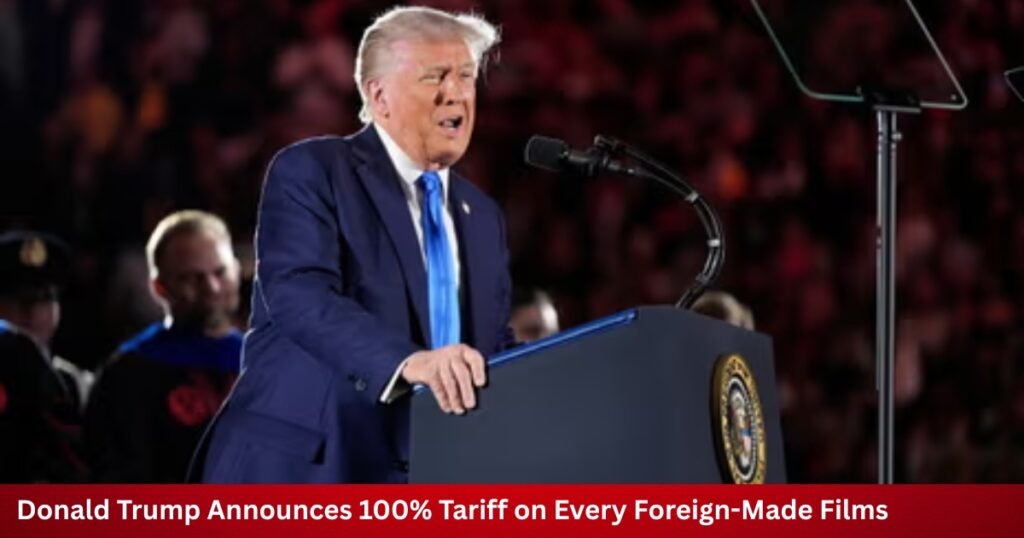
The current President of the United States, Donald Trump, announced on 4th May that there will be a 100% tariff on non-Hollywood movies. He also said that Hollywood is on a decline due to the incentives offered by other countries to attract American filmmakers. He posted this on his social media last sunday that led to criticism from many people. Keep reading to get a good understanding of this situation and why Trump said what he said.
Why Did Trump Announce the Tariff?
Trump announced the tariff as he felt that it was a combined effort and propaganda by other countries to draw American filmmakers away from the U.S. Besides that, he also spoke about speaking to the Department of Commerce to immediately begin the process of imposing tariffs on all outside films. As per his words, he wanted to see movies made in America again.
Though secretary of commerce Howard Lutnick posted his approval on X, it is unclear as to who or what this move will target. This is yet another chapter in Trump’s tariff saga that is obviously not beneficial to the other countries.
Experts Give Their Opinion
As per the information provided by FilmLA, a non-profit organisation in LA, film and television production in the city has fallen by 40% over the last years. But many experts say that they are not clear on how the tariff will work and who will be charged with them. As per entertainment consultant Kathyrn Arnold, the US government’s or president’s job is not to understand how movies are actually made.
Though some experts have agreed that the president has identified a real problem, they say imposing tariffs cannot be the solution. Though Trump’s global war trade has led to imposition of tariffs on the goods of other countries, foreign movies are intellectual properties and part of the global trade service for which the United States is a net-exporter.
Why It Doesn’t Make Sense?
As per Kathryn Arnold, tariffs don’t make sense as the global film market is both complex and interconnected when it comes to both production or distribution. It can be devastating and won’t do anything good in the long run. Another expert, Tom Nunan says that Trump’s government thinks that they can improve domestic manufacturing when foreign manufacturing becomes more appealing to parts of the American industry.
This indicates that if there are tariffs on foreign goods, it can inspire domestic manufacturing. He said that it was predictable that the tariff thing would be imposed into the entertainment industry too. Nunan also thinks that if it is cost-prohibitive to make television in parts or motion pictures, or acquiring both from foreign territories, the foreign production would return to the United States. This is possibly what the Trump administration thinks as per Nunan.
Retaliation Can Kill the Industry
As per the former, senior commercial official William Reinsch, going against Trump’s decision to impose tariffs on international movies won’t be good. He said that this retaliation can possibly kill the industry and that there is more to lose than to gain. It would not be easy to make a national security or emergency case for movies.
Trump Voiced Concerns on American Movie Production Moving Overseas for a Long Time
Shortly before Trump joined office, announced that top actors like Sylvester Stallone, Mel Gibson, and Jon Voight would be special ambassadors to Hollywood to bring the industry back ‘BIGGER’, ‘BETTER’, and ‘STRONGER’ than ever before.
As per relevant data, the U.S. movie industry has diminished over the years due to the COVID-19 pandemic, various strikes and the LA wildfire. Compared to 2021, the production of movies in the United States has gone down 26%. This might explain why Trump was after imposing tariffs all these time.
Final Words
Though Trump announced the tariffs on non-US films, it is yet to be seen who or what gets affected. Amidst the trade war with other countries, the President has repeatedly made his voice be heard through his decisions. Only time will tell if this move will do any good to the U.S film production market or will other countries retaliate with their own tariffs. Due to the tariffs from Trump, the country has plunged into a trade war, with new impositions leading to uncertainty of the situation.



